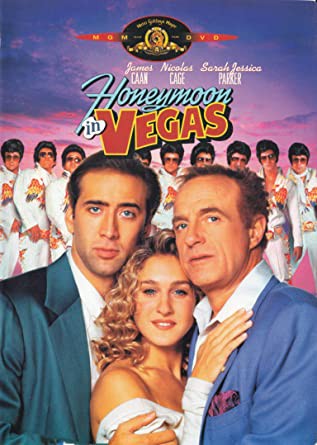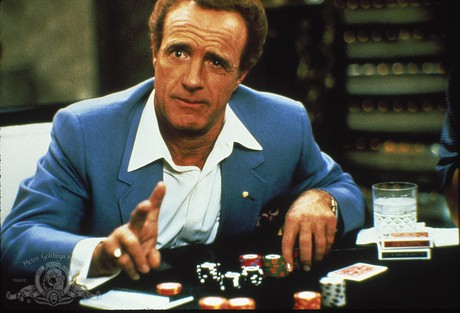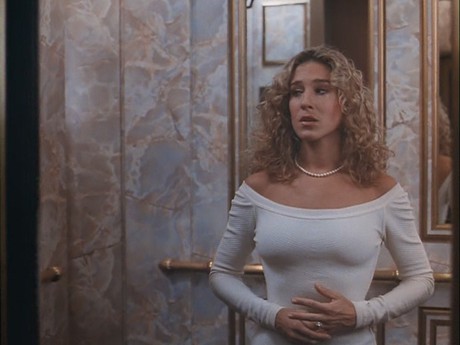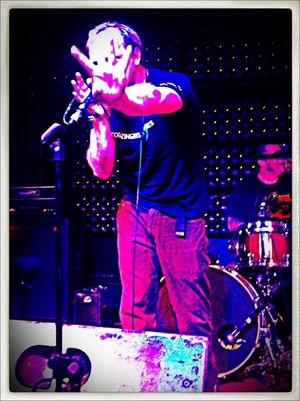Greetings to all! Here we are for Episode Thirteen of a Year of Nic Flicks and this week we're discussing the 1992 Comedy/Romance HONEYMOON IN VEGAS. It's been almost thirty years since I first saw this movie and I'll admit there was only one thing I remembered from that distant viewing: the parachuting Elvises. Elvi? Eh, we'll go with Elvises. In any case, the only thing I recalled was The Flying Elvises and bless my crap memory they are in the film. In fact, they're the last thing that happens in the film. That's right: the only thing I remembered from this movie was the end.

That has all changed since I've finally watched it again and I have to tell you all... it doesn't hold up. A lot of this movie doesn't work, but I'm happy to say that it's not James Caan or Nicolas Cage or even Sarah Jessica Parker. It's the film, itself; the script, the editing, the faux-tension, the jarring character turns. The entire feature plays like a discarded "Three's Company" episode, and unfortunately the trailer is just a thinly-veiled synopsis. Let me know if you disagree:
There's your Flying Elvises. At the end of the trailer like they are at the end of the movie, and you even know why. They show you the send-up. Why?
HONEYMOON IN VEGAS is written and directed by Andrew Bergman, who wrote the original script for BLAZING SADDLES, as well as FLETCH and, oddly enough, STRIPTEASE. By all counts this should have been a screwball comedy and is even marketed as one but ultimately chokes under its own pretense. Playing out like a preeminent INDECENT PROPOSAL, HONEYMOON finds Cage hornswoggled by a resourceful Caan who engineers a loss of $65,000 and accepts a weekend with Parker as adequate repayment. Hilarious, right? Let's have the hijinks ensue!

A note about Caan's Tommy character: when he is first introduced we see a man who is used to getting his way, and keeps his power in place with an iron fist, but once he sees Parker's Betsy, who very closely resembles his late wife, he softens considerably. The courting Tommy that we observe through much of the film is very sympathetic. At times we even look past the subterfuge of the poker game and focus on the man's words and actions with Betsy and we're on his side. He's a man of genuine emotion, led by pure love. It turns our stomachs when he hardens again toward the end of the film, as if we've betrayed ourselves by ever giving his advances any sort of passage. Tommy's ruin is our own, perhaps because we're so reticent to throw all of our chips in on Cage's Jack: a true Tripper of comic uncertainty.
The sitcom narrative reveals itself to be unfit for film in the way it warps the viewers' perceptions of protagonist and antagonist. Just because we started the film with Jack doesn't mean we need to root for him at the end, and for a brief period toward the middle we believe that may be true. But Bergman won't allow such ambiguity, and suddenly allows Tommy to reveal himself as the villain so that we can rally behind Jack. Even as the film concludes and Jack makes a metaphorical and literal leap of faith for love, I found myself underwhelmed by the gesture. The characters on screen had to tell me it was checkmate, an unbeatable hand, because I merely saw a guy do the same thing that two dozen other guys did... but he did it for love, so roll credits.
HONEYMOON IN VEGAS suffers from poor scene transitions, wild shifts in tone, and an overall flimsy premise. It is redeemed by great performances, an enviable supporting cast, and a mercifully short runtime. Cage is serviceable in his role but rarely anything to marvel at. His character needs little more than to be surprised, bewildered, irritable, and defeated. Jack Singer could have just as easily been played by Paul Reiser or, dare I say, John Ritter. Jack is largely insufferable; arrested in his own development as a partner, a professional, and an individual; he's rather unlikeable.

Perhaps what is most surprising about the film is how likeable Sarah Jessica Parker is as Betsy. This is not to say that Betsy is a meaty role as she does very little in the film, but she plays her doe-eyed love interest role with genuine magnetism. As an audience, we believe that Caan's Tommy believes he must possess her and Cage's Jack would jump out of a plane for her. More unbelievable, however, is her flickers of attraction to Tommy. Not to say that the character is without his charms, but the May-December romance never quite plays as feasible; as an audience we accept it only to push the film forward but we never truly believe it. Regardless, I will say that I was pleasantly surprised by how much I actually liked Parker in this film. I truly did not expect that.
Ultimately, HONEYMOON IN VEGAS doesn't hold up well for several reasons, the least of which is the antiquated conceit of the Women-as-Property narrative. Coupled with the jarring transitions and loose assemblage of story, HONEYMOON views as a late entry in a bygone genre of film. Stay for Caan's and Parker's performances, as well as scavenging cameos (Was that a young Bruno Mars? Is that Tony Shalhoub? Holy shit, Peter Boyle AND Pat Morita are in this flick?) but don't expect this film to stay with you long after the credits have rolled.
You may recall the Flying Elvises in thirty years, however.
Until next time, stay safe and stay sane!
-McEric, aka Eric McClanahan-

